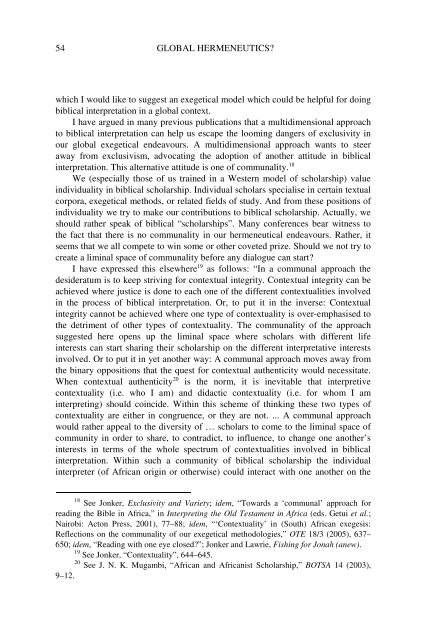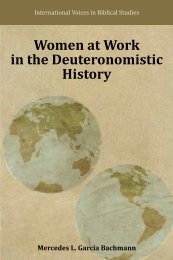Global Hermeneutics? - International Voices in Biblical Studies ...
Global Hermeneutics? - International Voices in Biblical Studies ...
Global Hermeneutics? - International Voices in Biblical Studies ...
Create successful ePaper yourself
Turn your PDF publications into a flip-book with our unique Google optimized e-Paper software.
54 GLOBAL HERMENEUTICS?<br />
which I would like to suggest an exegetical model which could be helpful for do<strong>in</strong>g<br />
biblical <strong>in</strong>terpretation <strong>in</strong> a global context.<br />
I have argued <strong>in</strong> many previous publications that a multidimensional approach<br />
to biblical <strong>in</strong>terpretation can help us escape the loom<strong>in</strong>g dangers of exclusivity <strong>in</strong><br />
our global exegetical endeavours. A multidimensional approach wants to steer<br />
away from exclusivism, advocat<strong>in</strong>g the adoption of another attitude <strong>in</strong> biblical<br />
<strong>in</strong>terpretation. This alternative attitude is one of communality. 18<br />
We (especially those of us tra<strong>in</strong>ed <strong>in</strong> a Western model of scholarship) value<br />
<strong>in</strong>dividuality <strong>in</strong> biblical scholarship. Individual scholars specialise <strong>in</strong> certa<strong>in</strong> textual<br />
corpora, exegetical methods, or related fields of study. And from these positions of<br />
<strong>in</strong>dividuality we try to make our contributions to biblical scholarship. Actually, we<br />
should rather speak of biblical “scholarships”. Many conferences bear witness to<br />
the fact that there is no communality <strong>in</strong> our hermeneutical endeavours. Rather, it<br />
seems that we all compete to w<strong>in</strong> some or other coveted prize. Should we not try to<br />
create a lim<strong>in</strong>al space of communality before any dialogue can start?<br />
I have expressed this elsewhere 19 as follows: “In a communal approach the<br />
desideratum is to keep striv<strong>in</strong>g for contextual <strong>in</strong>tegrity. Contextual <strong>in</strong>tegrity can be<br />
achieved where justice is done to each one of the different contextualities <strong>in</strong>volved<br />
<strong>in</strong> the process of biblical <strong>in</strong>terpretation. Or, to put it <strong>in</strong> the <strong>in</strong>verse: Contextual<br />
<strong>in</strong>tegrity cannot be achieved where one type of contextuality is over-emphasised to<br />
the detriment of other types of contextuality. The communality of the approach<br />
suggested here opens up the lim<strong>in</strong>al space where scholars with different life<br />
<strong>in</strong>terests can start shar<strong>in</strong>g their scholarship on the different <strong>in</strong>terpretative <strong>in</strong>terests<br />
<strong>in</strong>volved. Or to put it <strong>in</strong> yet another way: A communal approach moves away from<br />
the b<strong>in</strong>ary oppositions that the quest for contextual authenticity would necessitate.<br />
When contextual authenticity 20 is the norm, it is <strong>in</strong>evitable that <strong>in</strong>terpretive<br />
contextuality (i.e. who I am) and didactic contextuality (i.e. for whom I am<br />
<strong>in</strong>terpret<strong>in</strong>g) should co<strong>in</strong>cide. With<strong>in</strong> this scheme of th<strong>in</strong>k<strong>in</strong>g these two types of<br />
contextuality are either <strong>in</strong> congruence, or they are not. ... A communal approach<br />
would rather appeal to the diversity of … scholars to come to the lim<strong>in</strong>al space of<br />
community <strong>in</strong> order to share, to contradict, to <strong>in</strong>fluence, to change one another’s<br />
<strong>in</strong>terests <strong>in</strong> terms of the whole spectrum of contextualities <strong>in</strong>volved <strong>in</strong> biblical<br />
<strong>in</strong>terpretation. With<strong>in</strong> such a community of biblical scholarship the <strong>in</strong>dividual<br />
<strong>in</strong>terpreter (of African orig<strong>in</strong> or otherwise) could <strong>in</strong>teract with one another on the<br />
18 See Jonker, Exclusivity and Variety; idem, “Towards a ‘communal’ approach for<br />
read<strong>in</strong>g the Bible <strong>in</strong> Africa,” <strong>in</strong> Interpret<strong>in</strong>g the Old Testament <strong>in</strong> Africa (eds. Getui et al.;<br />
Nairobi: Acton Press, 2001), 77–88; idem, “‘Contextuality’ <strong>in</strong> (South) African exegesis:<br />
Reflections on the communality of our exegetical methodologies,” OTE 18/3 (2005), 637–<br />
650; idem, “Read<strong>in</strong>g with one eye closed?”; Jonker and Lawrie, Fish<strong>in</strong>g for Jonah (anew).<br />
19 See Jonker, “Contextuality”, 644–645.<br />
20 See J. N. K. Mugambi, “African and Africanist Scholarship,” BOTSA 14 (2003),<br />
9–12.




